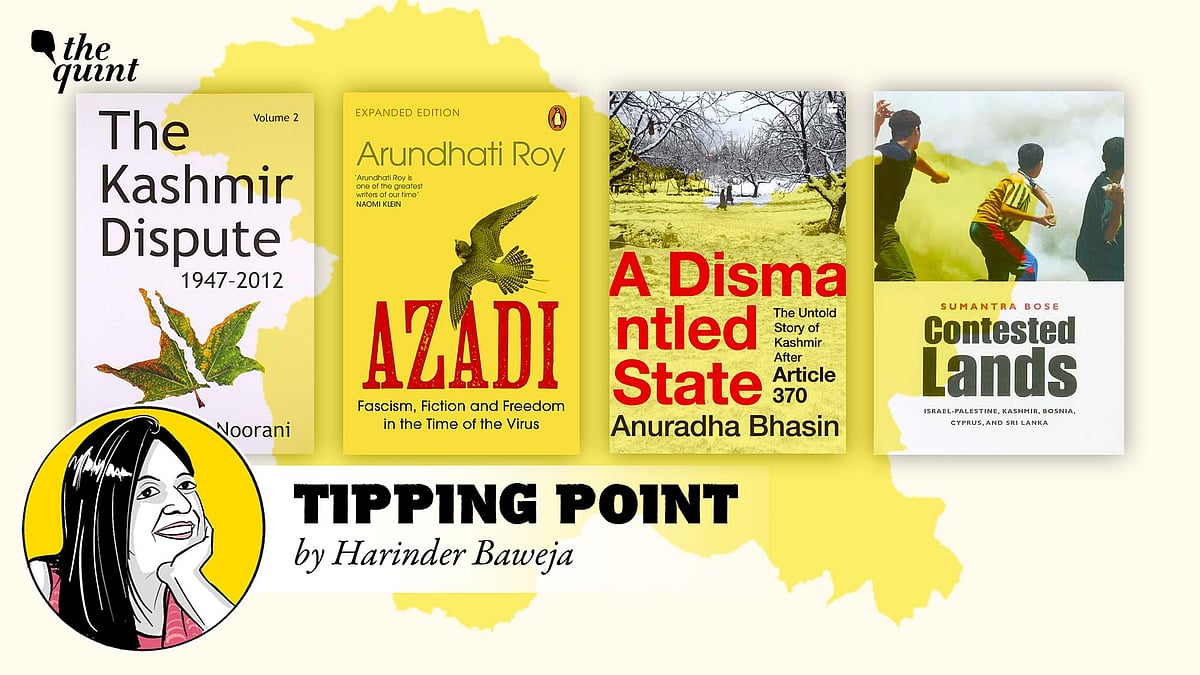
Why the J&K Book Ban Doesn’t Add Up, In Facts or Logic
The people in Kashmir view the ban as yet another move to suppress their freedom, writes Harinder Baweja.

advertisement
The decision by Jammu and Kashmir’s home department, headed by the Lieutenant Governor Manoj Sinha, is more than just a suppression of fundamental freedoms.
Ironically, Sinha and his colleagues have punctured their own narrative of a ‘Naya Kashmir.’ The ban also flies in the face of facts and figures that Prime Minister Narendra Modi and Union Home Minister Amit Shah themselves like to point to, repeatedly.
Let us first examine the contents of the notification issued by the LG’s home department on 5 August, a date no Kashmiri is ever likely to forget. The notification was issued on the same date that marked six years of the striking down of Jammu and Kashmir’s special status.
The Government’s Justification
The notification that banned 25 books said that "certain literature propagates false narrative and secessionism in Jammu and Kashmir" and that evidence based on investigations and credible intelligence indicated that "a significant driver behind youth participation in violence and terrorism has been the systematic dissemination of false narratives and secessionist literature by its persistent internal circulation, often disguised as historical or political commentary, while playing a critical role in misguiding the youth, glorifying terrorism and inciting violence against Indian State”.
The Authors and Their Works
The list of 25 books suddenly banned include those authored by Booker Prize winner Arundhati Roy, historian AG Noorani, journalist and editor Anuradha Bhasin, and political scientist Sumantra Bose. Let’s focus on the year of publication, because that is revelatory.
Arundhati Roy’s book titled Azadi, was published in September 2020.
Historian and constitutional expert AG Noorani’s book, The Kashmir Dispute: 1947 to 2012, was published in January 2015.
Anuradha Bhasin’s book, A Dismantled State: The Untold Story of Kashmir After Article 370, came out in December 2022.
Sumantra Bose’s book, Contested Lands, was published in April 2022.
Simple questions arise. If the books were contributing to the ‘radicalisation of youth’ or the ‘distortion of historical facts’ and the ‘glorification of terrorists (and the) vilification of security forces, were Sinha, his predecessors in Raj Bhawan and colleagues in the security and intelligence apparatus, unaware of their existence?
By no means am I supporting the ban of these, or any books, including Salman Rushdie’s Satanic Verses. All I’m trying to do is to point to the sheer ridiculousness of the ban.
Now, let’s look at plain facts and figures and analyse them in the context of the LG’s notification which proclaims that evidence indicates that "a significant driver behind youth participation in violence and terrorism has been the systematic dissemination of false narratives and secessionist literature.”
What the Ban Can and Cannot Do
The number of local Kashmiri recruit’s into militancy, for instance, came down to the single digit category in the year 2024. As per official data, 125 local youths had joined militancy in 2021 and that figure dropped to 100 a year later. The figure for 2025 (till July end), stands at a mere one. If books were really responsible for radicalisation and glorification of terrorists, the set of figures would be quite different, wouldn’t it?
Some questions, such as the one above, is not worth answering. But there’s another subset of questions that accrue from the LG’s notification.
Home Minister Amit Shah informed the entire country, on the first day of the debate on Operation Sindoor, that the terrorist’s responsible for the killing of tourists had been eliminated, and that all were of Pakistani origin. It is a no-brainer to point out that the ban of 25 books is applicable only within the geographical confines of the union territory of Jammu and Kashmir. What about the thousands of Kashmiri’s living in the rest of the country? Well, the books are available online.
Reality on the Ground
Apart from the LG, none of Kashmir’s leaders—political and religious—have had anything but condemnation for the ban. It is difficult to disagree with the Jammu and Kashmir People's Democratic Party's (PDP) former chief minister, Mehbooba Mufti, who said, “Democracy thrives on the free exchange of ideas. Banning books cannot erase history, it only fuels division…Censorship doesn’t silence ideas, it amplifies their resonance.”
Mirwaiz Umar Farooq, the Valley’s chief priest and chairman of the Hurriyat Conference too lent his voice , pointing out that the ban cannot erase historical facts or the repertoire of lived memories of the people of Kashmir.
The government can certainly try and peddle a narrative with words like ‘radicalisation’ and ‘secessionism’ but one thing is clear: there aren’t too many takers for his arguments.
If anything, the people in Kashmir view the ban as yet another move to suppress their freedom and as Mehbooba Mufti put it, censorship truly cannot silence ideas.
Postscript: J&K has a chief minister but all issues pertaining to security in the UT, which is still a conflict zone, rests with the LG. The terrorist strike in Pahalgam has laid out the LG's priorities and they involve ensuring that another attack does not take place. He can do better by not engaging the security and intelligence agencies with the task of reading books that have, for long, been in the public domain.
- Access to all paywalled content on site
- Ad-free experience across The Quint
- Early previews of our Special Projects
Published: undefined